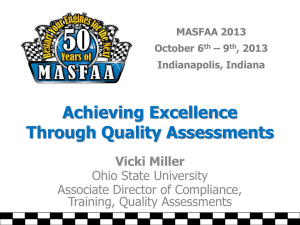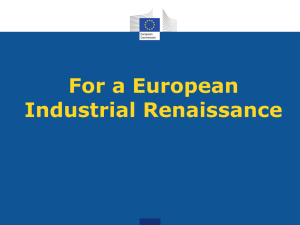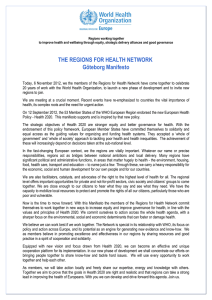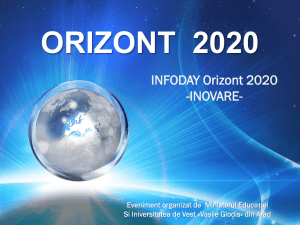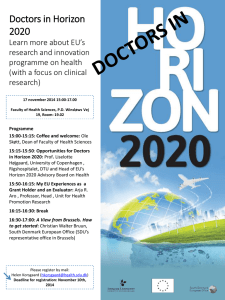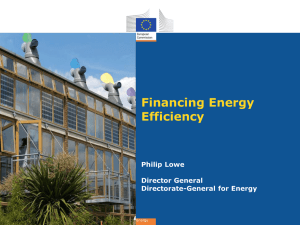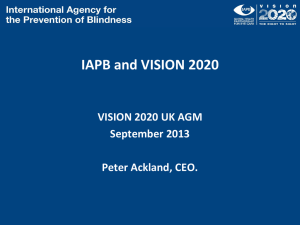SpectraFlow Analytics Ltd
advertisement
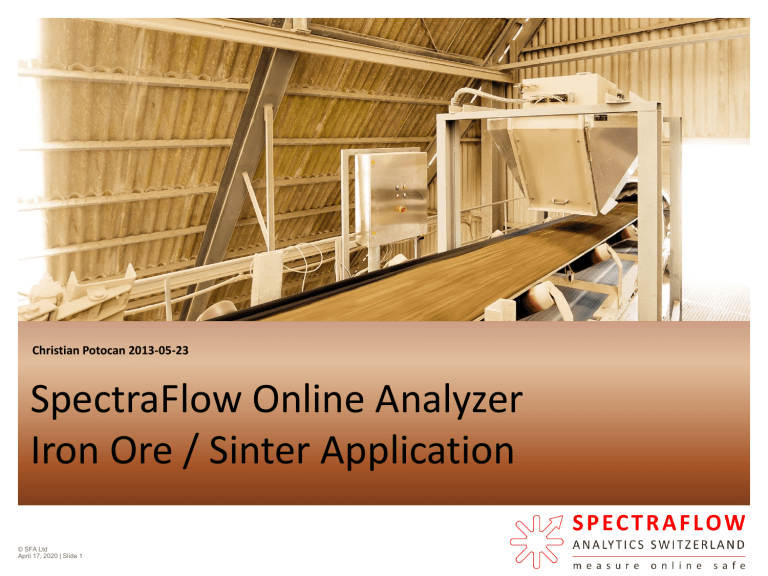
Christian Potocan 2013-05-23 SpectraFlow Online Analyzer Iron Ore / Sinter Application © SFA Ltd April 17, 2020 | Slide 1 Contents History Near Infra Red (NIR) – The Technology The Model Development Comparison of different analytical methods SpectraFlow in the Sinter Production Process SpectraFlow – The hardware setup References © SFA Ltd. April 17, 2020 | Slide 2 History – SpectraFlow: a real success story 2006: ABB started the development of the SpectraFlow Analyzer 2007: First trials in the USA and Switzerland 2008: Test installations for Limestone Quarry and Sinter in Italy, Norway and Germany 2009: First commercial installation on a conveyor belt in a Cement plant in Slovakia 2010: First tests for the airslide application 2011: Multiple installations around the globe: Saudi Arabia, Oman, Iran, Pakistan, Germany and Switzerland 2012: First commercial installation on an airslide after the Raw Mill in Switzerland and Brazil 2013: Foundation of SpectraFlow Analytics and transfer of the SpectraFlow business from ABB to SFA 2013: 10 successful installations around the world and multiple orders received. SpectraFlow is established in the market and technically mature © SFA Ltd. April 17, 2020 | Slide 3 NIR Technology - Objectives of the development Select a proven and accepted analysis technique that will give fast and reliable analysis Make sure that no hazardous materials are needed in the operation of the system Eliminate radioactive sources, neutron generators or X-Ray components Eliminate the need for permits or licences for the operation of the system Provide real-time on-line analysis for any kind of bulk material by a single technology to analyse all Molecules Mineral phases Module parameters © SFA Ltd April 17, 2020 | Slide 4 NIR Technology - Minerals have a NIR signature SiO2 Fredrickson : Characterisation of hydrated Alumina by NIR 1954 Hunt, Salisbury: Visible and Near Infra Red Spectra of Minerals and Rocks 1970 Hunt, Salisbury: Visible and Near Infra Red Spectra of Minerals and Rocks 1970 FeO CaO Hunt, Salisbury: Visible and Near Infra Red Spectra of Minerals and Rocks 1970 © SFA Ltd April 17, 2020 | Slide 5 NIR Technology - Principle of the measurement When energy (light) hits any matter this matter gets excited and starts to vibrate This vibration is characteristic for any mineral or molecule and according to that consumes a specific energy Symmetrical stretching Asymmetrical stretching In plane scissoring Out of plane wagging Out of plane twisting In plane rocking As the amount of energy emitted is known and the amount of energy reflected is measured, the amount of energy consumed is calculated The consumed amount of energy is the mineralogical fingerprint of the raw material As the information of the raw material is determined out of the movement of the crystal structure and molecules and not the elements, all elements can be measured © SFA Ltd April 17, 2020 | Slide 6 NIR Technology - Principle of the measurement FTIR Spectrometer TCP/IP Connection to RMP Input Lens, which ascertains parallel beams inside spectrometer Lamp shining at the material Belt Conveyor © SFA Ltd April 17, 2020 | Slide 7 Light Paths Industrial PC with Soft PLC Lamp shining at the material Iron Ore Mix Model development - The Principle TRAINING = CALIBRATION FeO 65.50 % CaO 0.95 % SiO2 1.3 % H2O 5.6 % How much FeO, CaO, SiO2 and Moisture does this Spectra mean? The analyzer has to be trained, to translate the Spectra into the chemical composition © SFA Ltd April 17, 2020 | Slide 8 Model development - The calibration process © SFA Ltd April 17, 2020 | Slide 9 To develop the relationship reference material has to be supplied The reference material has to represent the range of the material to be measured The reference material has to be delivered with accurate chemical analysis Depending on the complexity of the application 20 to 50 samples are needed to develop the initial calibration The samples are measured in a dynamic mode and the spectra for the different materials are obtained Comparison of different analytical methods XRF PGNAA SpectraFlow Measurement Method Offline Online Online Source of Energy X-Ray Tube Radioactive Source Lightbulbs Analysis Basis Elements possible to measure Dependency Electron Shells dependent on Calibration: from F (WDX) or Na (EDX) Vacuum, Sample Preparation Nucleus from Na (Cf source) (neutron tube) Belt Speed, Belt Load Molecules, Mineral Phases Depth of Analysis µm Up to 500 mm µm - mm Measurement Principle Possible Measurement Positions Reports Reflexion Transmission Reflexion Conveyor Belt Conveyor Belt, Airslide Elemental Analysis Elemental Analysis Mineral Phases, Oxides Repeatability Fair to Good Poor Good Measurement time Analytical Error Sampling Accuracy Error Seconds Minutes high to low dependent on Element Seconds high to very high low very low high to very high low very low X-Ray tube Radioactive Source light-bulbs Total Error Consumables © SFA Ltd April 17, 2020 | Slide 10 very low from O all elements: including H no nonlinear layering low Model development - The resulting models 71.00 70.00 69.00 68.00 67.00 66.00 65.00 64.00 63.00 62.00 61.00 60.00 Model for SiO2 on Pos A Predicted Concentration [%] Predicted Concentration [%] Model for FeT on Pos A 62.00 64.00 66.00 68.00 70.00 6.00 5.00 4.00 3.00 2.00 1.00 0.00 0.00 1.00 XRF Concentration [%] 0.2000 0.3000 0.4000 Predicted Concentration [%] XRF Concentration [%] © SFA Ltd April 17, 2020 | Slide 11 4.00 5.00 6.00 Model for Al2O3 on Pos A Predicted Concentration [%] 0.1000 3.00 XRF Concentration [%] Model for CaO on Pos A 0.4500 0.4000 0.3500 0.3000 0.2500 0.2000 0.1500 0.1000 0.0500 0.0000 0.0000 2.00 0.5000 2.50 2.00 1.50 1.00 0.50 0.00 0.00 0.50 1.00 1.50 XRF Concentration [%] 2.00 2.50 Model development - The accuracy of SpectraFlow Sample Number 1 2 3 4 5 6 7 8 9 10 Sample Number 1 2 3 4 5 6 7 8 9 10 © SFA Ltd April 17, 2020 | Slide 12 Iron (FeT) actual/% 67.42 67.60 66.64 69.14 61.74 62.35 66.71 66.30 CaO actual/% 0.4300 0.3400 0.3500 0.3700 0.0000 0.0200 0.0400 0.0400 0.0200 0.0100 predicted / % Rel Error / % 66.74 1.00 66.96 0.95 65.08 65.89 1.13 68.99 0.22 69.82 62.25 0.83 61.87 0.76 67.19 0.72 66.75 0.68 predicted / % Rel Error / % 0.4156 3.34 0.3509 3.21 0.3418 2.34 0.3735 0.93 0.0062 0.0222 11.25 0.0389 2.86 0.0406 1.57 0.0196 2.08 0.0114 14.28 Sample Number 1 2 3 4 5 6 7 8 9 10 SiO2 actual/% 1.48 2.30 2.01 2.30 0.62 0.60 5.30 4.90 3.62 4.32 predicted / % Rel Error / % 1.72 16.18 2.16 5.94 2.21 10.16 2.29 0.28 0.56 9.36 0.62 3.48 5.32 0.37 4.76 2.81 3.87 6.89 4.09 5.32 Sample Number 1 2 3 4 5 6 7 8 9 10 Al2O3 actual/% 0.46 0.51 0.50 0.55 0.42 0.40 2.04 1.93 0.58 0.57 predicted / % Rel Error / % 0.47 2.31 0.52 1.36 0.50 0.81 0.53 3.28 0.41 2.71 0.40 1.22 1.98 2.97 1.96 1.32 0.58 0.75 0.57 0.75 Comparison of different analytical methods XRF SOLBAS™ PGNAA Measurement Method Offline Online Online Source of Energy X-Ray Tube Radioactive Source Lightbulbs Analysis Basis Elements possible to measure Dependency Electron Shells dependent on Calibration: from F (WDX) or Na (EDX) Vacuum, Sample Preparation Nucleus from Na (Cf source) from O (neutron tube) Belt Speed, Belt Load Molecules, Mineral Phases Measurement Principle Possible Measurement Positions Reports Reflexion Transmission Reflexion Conveyor Belt Conveyor Belt, Airslide elements: including H PGNAA can’ t measure iron ore: due to a veryallhigh response no nonlinear layering of Fe all Depth of Analysis µm other elements Up tocan’ 500 mm t be recognized µm - mm Elemental Analysis Elemental Analysis Mineral Phases, Oxides Beside the important elements FeO, CaO and SiO2 also Repeatability Fair to Good Poor Good Measurement time Seconds Minutes Seconds moisture can be measured Analytical high to low dependent on Accuracy Error Sampling Error Total Error Consumables © SFA Ltd April 17, 2020 | Slide 13 very low Element low high to very high low very low high to very high low very low X-Ray tube Radioactive Source light-bulbs SpectraFlow - Position in Sinter production process Control the quality of the Iron Ore for stable Stockpiles POSITION A SPECTRAFLOW ANALYZER IRON ORE STOCKPILE B IRON ORE STOCKPILE A Control the Bacisity (CaO/SiO2ratio) of the sinter mix IRON ORE STOCKPILE C POSITION B CONTROL SOFTWARE LIMESTONE ADDITIVE WATER WATER RETURNS COKE RAW MIX HOPPER BLENDED ORE COKE MIXING DRUM BURN THROUGH AREA IGNITION HOOD Lower returns due to more consistant quality of the feed ROLLER CRUSHER TO ATMOSPHERE WIND BOXES COOLING FANS GAS CLEANING FAN HOT RETURN FINES BLAST FURNACE © SFA Ltd April 17, 2020 | Slide 14 HOT SCREEN COLD SCREENING BUNKER COLD RETURN FINES SpectraFlow – The hardware setup Spectrometer Box Control Panel Illumination Head © SFA Ltd April 17, 2020 | Slide 15 SpectraFlow – The hardware setup FTIR Spectrometer Light and dust shield Lamp Use 4 lamps 50 Watt each Bulk Material © SFA Ltd April 17, 2020 | Slide 16 Lamp holder SpectraFlow - The hardware setup Spectrometer Compartment Flap which can be opened to access the lights Overall view Entry for the reflected Infrared into Spectrometer Flap open Interfaces Power Supply for the spots Industrial PC (IPC) Light Spots View of the inside ceiling © SFA Ltd April 17, 2020 | Slide 17 Electronic Panel opened SpectraFlow – ROI Calculation of the investment Increased production due to reduced rejects because of a more stable quality GAINS FROM THE ANALYZER2) PRICES Analyzer costs total [CHF] Analyzer costs total [JPY] Sinter/t [JPY] Production cost of Sinter/t [JPY] Number of Analyzers Costs per Analyzer [JPY] Calcualtion on a 2 years pay back COMMERCIAL CONDITIONS 5) 1.50 Interest Rate [%] CHF 450'000 Increased Throughput [%] Pay Back Time [y] ¥47'250'000 ¥15'000 ¥5'000 1 ¥47'250'000 10% 4) SpectraFlow has a payback time of 3 months as the increased throughput is based on the reduction of the rejects PROFIT CALCULATION Output Today [t/h] 3) 253.75 Increased earnings/y [JPY] Output with SF [t/h] Operation [d/y] 4) 240 Earnings/d [JPY] PROFIT DURING PAY BACK -¥27'225'000.00 ¥216'000'000.00 ¥188'775'000.00 ¥216'000'000.00 PAYBACK PER YEAR6) GROSS PROFIT PER YEAR7) NET PROFIT DURING PAY BACK TIME 8) NET PROFIT AFTER PAY BACK TIME 9) Increased earnings per year during pay back © SFA Ltd April 17, 2020 | Slide 18 21'600 250.00 Increased Throughput/y [t] 1) ¥216'000'000.00 ¥591'780.82 Increased earnings per year after pay back 2 Reference List (17 analyzers in 10 countries worldwide) © SFA Ltd April 17, 2020 | Slide 19 SpectraFlow Analytics Ltd Seestrasse 14b CH-5432 Neuenhof Tel: +41 56 406 12 12 Fax: +41 56 406 12 48 www.spectraflow-analytics.com © ABB Group April 17, 2020 | Slide 20
